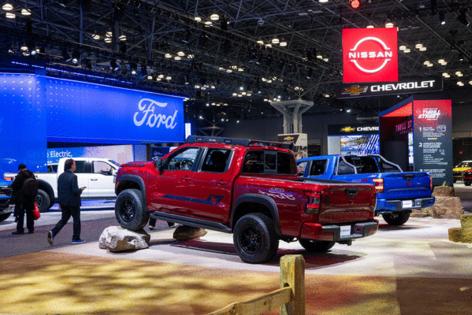Trump's tariffs on North America also set to pummel Asian allies
Published in News & Features
Donald Trump’s planned tariffs on Mexico and Canada are also dealing a blow to some of the U.S.’s closest allies in Asia.
Japanese automakers and South Korean car, steel and battery companies that supply the U.S. from plants in Mexico and Canada found themselves caught in the middle after Trump imposed 25% tariffs on the nations. Japanese stocks plunged on Monday, with both major benchmarks falling the most since September, while South Korea’s Kospi Index dropped 2.5%.
Based on one estimate, Japanese auto companies are facing a potential $10 billion decline in combined annual profits from their shipments to the U.S. as a result of Trump’s plan to impose a 25% tariff on all imports from Mexico and Canada. And it could get worse: Canada and Mexico have both vowed to respond in kind to the U.S. tariff plan, which is scheduled to come into effect on Tuesday.
Other U.S. security partners may also feel the pinch. On Monday, Taiwan’s government pledged to help companies with Mexico operations such as iPhone maker Foxconn Technology Group shift production lines and investment as needed to deal with higher U.S. tariffs.
“Companies are panicking,” said Yeo Han-koo, a former South Korean trade minister who is now a senior fellow at the Peterson Institute for International Economics. “They don’t know at this point how this tariffs tit-for-tat could elevate during the Trump era.”
The stakes are high for Japan, South Korea and Taiwan, and not just for economic reasons. The largest permanent overseas U.S. military bases are in South Korea and Japan, and the Asian nations continue to rely heavily on the U.S. military to deter China and North Korea. In a recent phone call, U.S. Defense Secretary Pete Hegseth and his counterpart Japanese Defense Minister Gen Nakatani agreed to continue efforts to strengthen the U.S.-Japan alliance.
Trump’s actions toward countries like Canada showed that he was unlikely to take alliances into account when pressuring other nations, according to Bob Carr, a former Australian foreign minister. Whereas Trump hit Canada and Mexico with 25% tariffs, he levied duties of only 10% on China.
“You can’t have tearful celebration of our shared values and all that goes with being an ally, and at the same time you’re saying ‘Well, we’re just treating you like an enemy,’” Carr said.
The tariff dispute is an ominous sign ahead of an expected visit to Washington later this week by Japanese Prime Minister Shigeru Ishiba for his first face-to-face meeting with Trump. The president has in past years complained about the dominance of Japanese automakers and Tokyo’s trade surplus with the U.S., although he hasn’t raised those issues since returning to the White House last month.
Japanese officials say Ishiba will highlight major investments and job creation by Japanese companies in the U.S., a message helped by a recent pledge by SoftBank Group Corp. to invest $100 billion in the U.S. over the next four years to create 100,000 jobs. Ishiba has himself hinted at possible new deals to buy more American oil and gas, something that South Korea is also considering.
South Korea’s Acting President Choi Sang-mok met with local exporters on Monday and vowed “all available measures” to help them. Seoul recently sent a working-level team to Washington to get more specific details of Trump’s trade policy, and government officials say they are working on action plans to minimize the impact on Korean businesses.
While the tariffs planned on goods from Canada and Mexico are intended as a response to alleged security threats from flows of drugs and immigrants, Trump has also said he is ready to impose tariffs to counter trade imbalances. Trump on Sunday reiterated a warning to the European Union that tariffs affecting the bloc “will definitely happen.”
The biggest impact on Japan from the U.S. plan for tariffs on Mexico and Canada will be felt in the auto industry. Japanese companies exported around half of the total 2.77 million vehicles sent to the U.S. last year from Mexico, according to Mexico’s National Institute of Statistics and Geography.
Citigroup Inc. estimates a combined decline in annual profit among the four major Japanese carmakers with operations in Mexico and Canada of ¥1.58 trillion ($10.2 billion). Toyota Motor Corp. has Mexican manufacturing sites in Baja California and Guanajuato where it assembles Tacoma pickup trucks. Together they produce about 260,000 trucks annually for the North American market.
Among Japanese companies, ailing Nissan Motor Co. sends the most autos to the U.S. market from Mexico. Cars made in Mexico accounted for almost a quarter of Nissan’s U.S. sales in 2023, according to a spokesperson.
Kia Corp. is the sole South Korean automaker with operations in Mexico.
Korean companies have also built up operations in Mexico for steel and in Canada for batteries.
South Korea’s top steelmaker Posco Holdings Inc., which supplies to car and home appliance makers from its galvanized steel, rolled steel and wire rod processing plants in Mexico, will closely monitor the situation as the Trump’s tariffs, the company said in response to a Bloomberg query.
Japan’s Trade Ministry said on Sunday it has set up a consultation service for companies that will potentially be affected by new U.S. tariffs in the Americas.
“By the time a car has been produced in North America, the materials used from start to finish are said to cross the border an average of eight times,” Hirohisa Akahira, a director at Japan External Trade Organization’s New York branch, said in a report. “The impact is going to be huge if Mexico faces additional tariffs.”
-------
—With assistance from Nicholas Takahashi, Yoshiaki Nohara, Jasmine Ng, Sam Kim, Debby Wu, Ben Westcott, Yuko Takeo and James Mayger.
©2025 Bloomberg L.P. Visit bloomberg.com. Distributed by Tribune Content Agency, LLC.







Comments